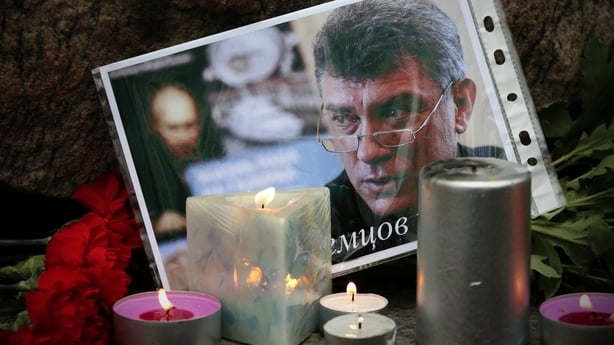US President Barack Obama has said the killing of protest leader Boris Nemtsov is a sign of a worsening climate in Russia where civil rights and media freedoms have been rolled back in the last several years.
Mr Nemtsov, 55, was shot dead close to midnight Friday in a heavily policed area on a bridge just metres from the Kremlin.
Mr Obama called for a full investigation into the slaying of Mr Nemtsov, a critic of Russian President Vladimir Putin, and a former deputy prime minister.
He said: "I have no idea at this point exactly what happened.
"What I do know is more broadly the fact that freedom of the press, freedom of assembly, freedom of information, basic civil rights and civil liberties inside of Russia are in much worse shape now than they were four or five, ten years ago."
Mr Obama met Mr Nemtsov met during a trip in 2009 to Moscow, where the US president held talks with opposition parties.

Russian authorities have suggested the opposition itself may have been behind the shooting in an attempt to create a martyr and unite the fractured movement.
Mr Nemtsov's supporters have blamed the authorities for his killing.
Nemtsov's girlfriend allowed to leave Russia
The chief witness in the murder of Mr Nemtsov has been able to leave Russia and is now on her way to Kiev, Ukraine's foreign ministry spokesman has said.
"Ganna Duritska has just left for Kiev. Ukrainian diplomats in Moscow provided all the necessary assistance for her return home," Yevhen Perebyinis wrote on his Twitter feed.
The 23-year-old, who was Mr Nemtsov's girlfriend, was at his side when he was shot dead on Friday.
She had complained of being kept under guard in Moscow in the days since the assassination.
Ms Duritska said earlier today she had given all the information she could to investigators but they were preventing her from leaving Russia, citing concerns for her security.
"For three days they have escorted me in police cars to the Investigative Committee," Ms Duritska told the independent Dozhd television channel, referring to the agency in charge of the probe.
"They don't explain when I will be let go or for what reason I am kept here."
Ms Duritska's mother Inna Duritska told AFP she feared that her daughter's de facto house arrest meant investigators might be preparing to make her a pawn in the deepening Russia-Ukraine crisis.
Polish and Latvians denied entry to Russia for funeral
Meanwhile, senior Polish and Latvian officials who sought to attend the funeral of Mr Nemtsov said they had been denied entry into Russia on the eve of the ceremony.
A Polish foreign ministry spokesman said Senate speaker Bogdan Borusewicz was refused entry by Moscow in retaliation for EU sanctions against Russia's upper house of parliament speaker Valentina Matviyenko.
Latvian MEP Sandra Kalniete told AFP she had been refused entry into Russia at Moscow's Sheremetyevo airport, but was not given a reasonable explanation for the ban.
"After two hours of waiting they told me I was refused entry into Russia according to their codex paragraph 27, point 1.
"I asked what exactly does that paragraph say and no one was able to answer," Kalniete said via telephone, speaking from the airport where she said she would have to spend the night.
"Since I have always taken a clear and explicit language on Russia's role in Ukraine, I had suspicions that it could happen," she said, terming the ban "insulting" to both Latvia at the European People's Party (EPP) which she also represents.
"I feel really proud to be labelled an enemy of Russia today. Russia in its current state does not have many friends," Kalniete said, adding that she had met Nemtsov on his visits to the European Parliament.
Russian Foreign Minister Sergei Lavrov has described the killing of Mr Nemtsov as "a heinous crime" and vowed it would be fully investigated.
Speaking at the opening of the UN Human Rights Council's main annual session in Geneva, Mr Lavrov insisted the killing would "be fully investigated within the full framework of the law to ensure the perpetrators are brought to justice".
"President (Vladimir) Putin immediately handed down all instructions and is ensuring special control over this investigation."

